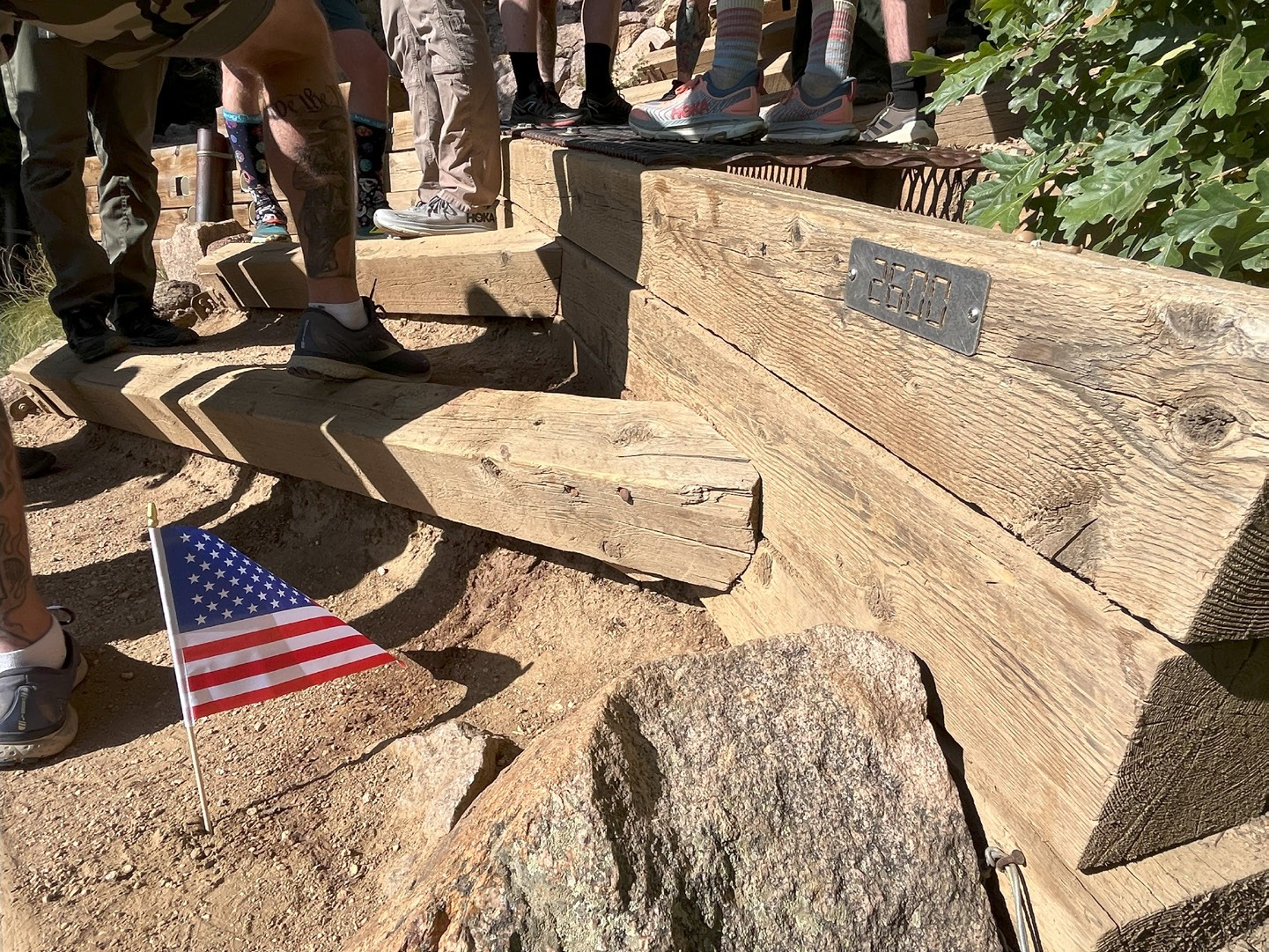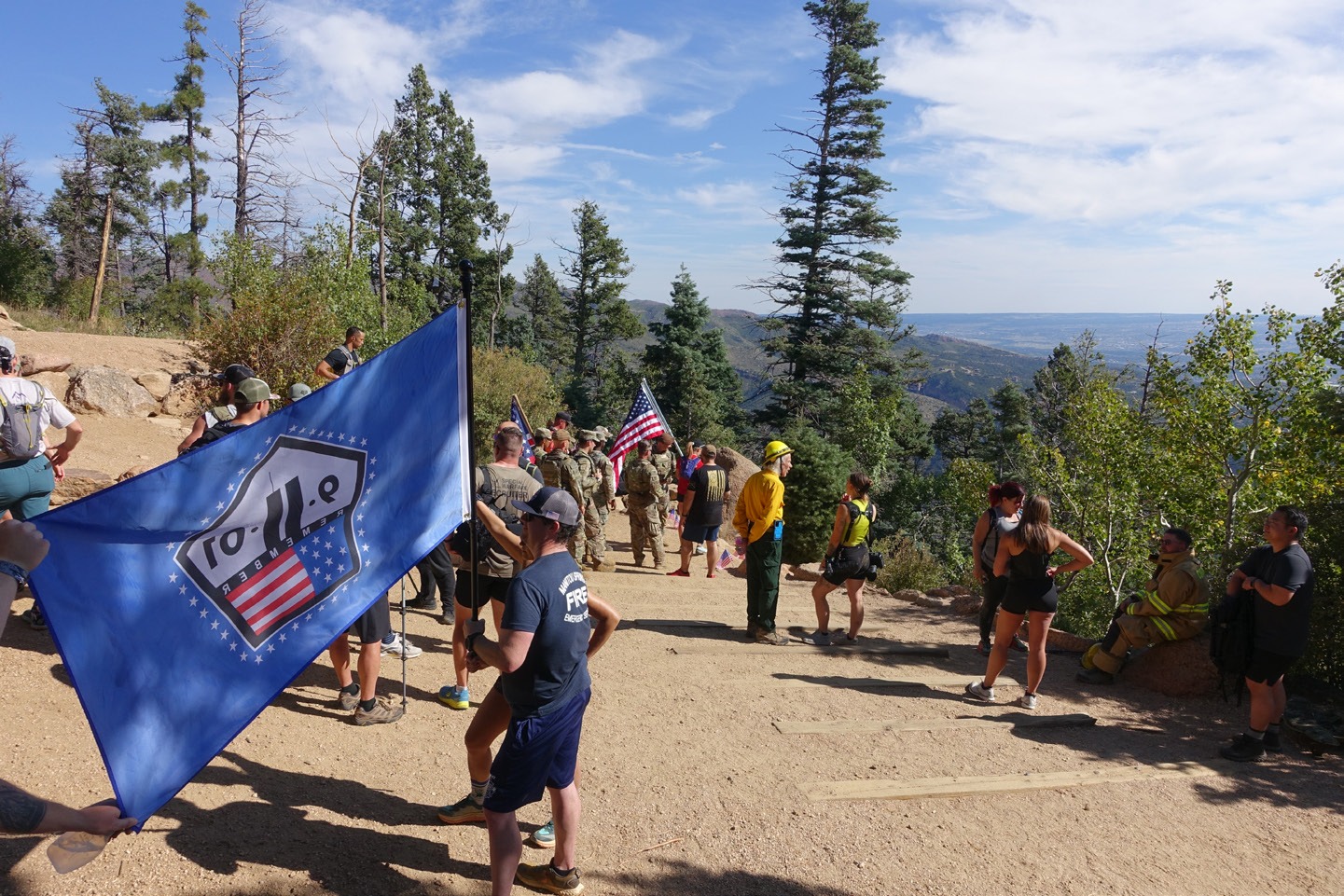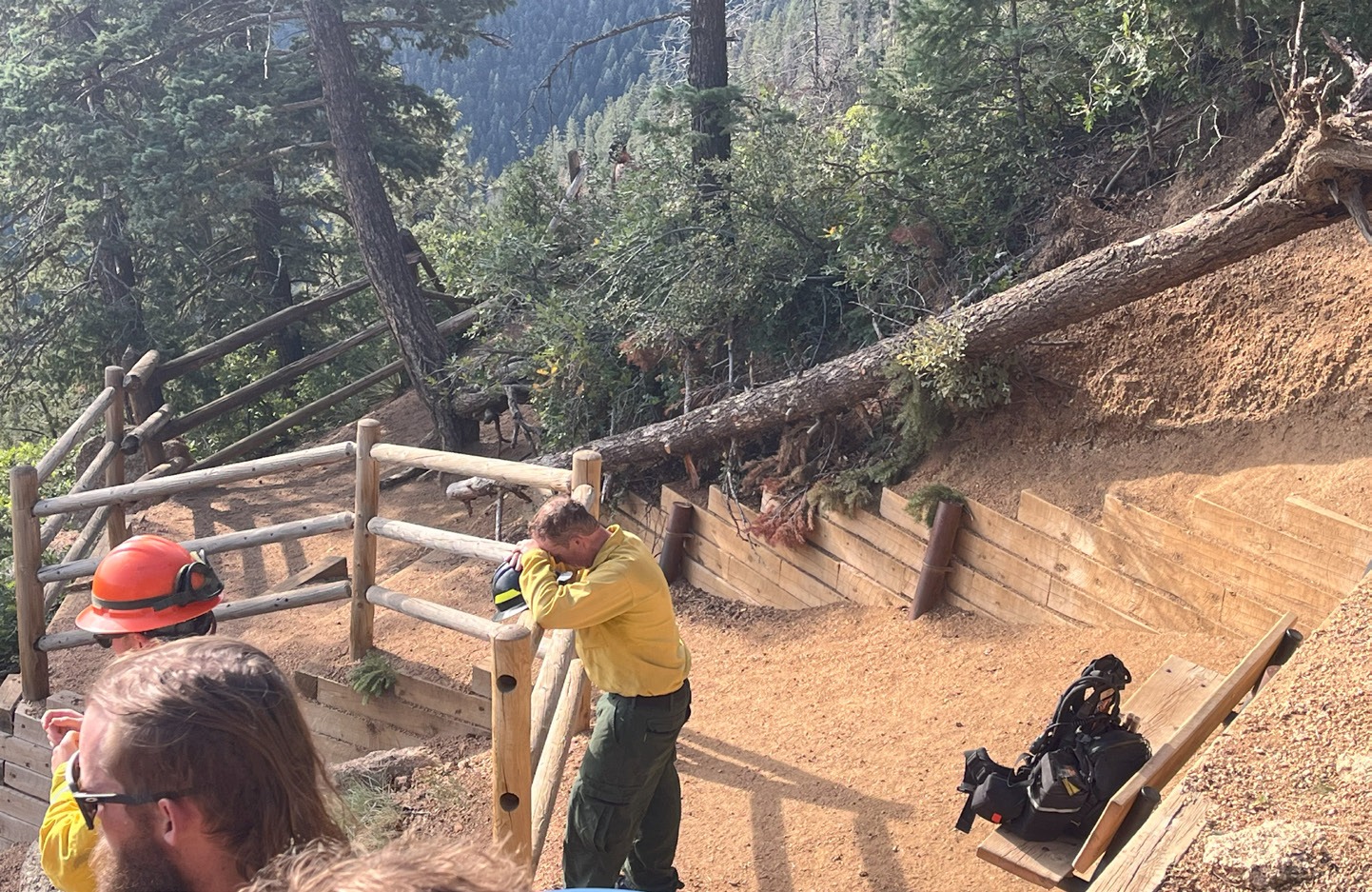On Sept. 11, 2001, members of the al-Qaida terrorist group hijacked four commercial planes – two crashing into the North and South Towers of the World Trade Center complex in New York City, causing them to collapse; one smashing into the Pentagon in Arlington, Virginia; and the last – thanks to the heroic intervention of passengers onboard – crashed in Pennsylvania short of its intended Washington D.C. target. Nearly 3,000 lives were lost that day.
At 8 a.m. on Sept. 11, 2024, a group of over 30 people gathered at the base of the Manitou Incline to ascend in memory of the events of that day. The crowd included firefighters decked in their turnouts and air tanks, military members in fatigues, other veterans and first responders, and unaffiliated citizens of all ages.

Before they began, Manitou Springs firefighter Dave Crawford addressed the group.
The day before, he and his wife Kristin had planted a small American flag every 8 steps up the Incline to commemorate the 343 firefighters who died in the rescue efforts that day. In his speech, Crawford spoke of how humbling it was to participate in the memorial. He was encouraged by all these organizations coming together and asked everyone not only to take time to reflect on the day but to remember the way it was intended to divide us, and how instead it united us.
“To me, that was the greatest America I ever lived in,” he said, his voice trembling with emotion.
He spoke on the cost of freedom, touching on how some in attendance had experienced this firsthand through their service and their families.
“That never changes,” he said. “There’s a huge cost, so don’t ever forget that.”
Crawford concluded with a prayer.
“Lord, we ask you to be with these brothers and sisters today. We showed up to remember and never forget, and we ask you to keep us healthy and be in our minds. And help us remember those who lost their lives, and that freedom isn’t free, and the scripture that says that there is no greater gift than those who give their life for their brother or sister. Keep us safe. In Jesus name we pray, amen.”
For the next couple hours, led by a U.S. Army squad bearing American and 9/11 commemorative flags, the group ascended, pausing at the times corresponding to the day’s key events for a moment of silence.
Along the way, a few shared military experiences, others in the comradery. Others gave encouragement to the struggling; some marched in quiet contemplation. An occasional cameraman crept out from the hillside to capture a moment. A couple hikers stepped aside to allow the group to pass, thanking them for their service.
At the top, groups posed for pictures, a few individuals were pulled aside for interviews, others were content to linger and take in the moment.
Crawford shared his personal connection to 9/11 with the Pikes Peak Bulletin.

Twenty-three years ago on that fateful day, Crawford, then a firefighter with the Northbrook Fire Department in Illinois, was teaching a class when his students’ phones started ringing, to the point they asked him to turn on the TV.
His parents were both retired United Airlines workers, and so as the images flashed across the screen, his thoughts flew from those in the air above to his colleagues on the ground, tasked with something of unprecedented magnitude in their profession at that time.
Referencing video footage of the rescue efforts, Crawford said that when firefighters enter a building, they often cannot see and must rely on other senses besides their vision to guide them. It may be the smell of gas, the sound of voices, or feeling their way around to avoid danger. He also explained how firefighters’ air packs, when low or malfunctioning, give off single or double tones.
“We’re trained to listen to that sound because that means that one of our brothers or sisters is down,” he said. “That’s why … firefighters get super emotional when they watch these old videos; it’s because that’s all that you see in those videos, those terrible sounds.”
Crawford noted that it’s not uncommon for 100 firefighters to die yearly in the line of duty – even in typical times, it’s a dangerous job. His own department at the time sent two teams to New York to help with the efforts. It brought to light the real dangers assumed by first responders daily. That day, he said, it felt like war.
For Crawford, 9/11 was a reminder that despite our freedoms, we were no less vulnerable than the rest of the world and that working together, we were stronger as a nation. To him, the Incline Memorial Climb was a reminder of this: people focusing their efforts towards pursuing a common and greater goal.
“People weren’t talking politics, people weren’t talking gender, they weren’t talking any of that nonsense,” he said. “It was all about us, Americans, and like, what can we do, and how can we contribute, and how can we come together? And, you know, it was awesome. It was awesome because all of the other stuff, the static, was gone.”
In particular, he remembered an encounter with one woman whose story gave him goosebumps.

“She had a badge, and I said, ‘Oh, were you a chief?’ And she said, ‘No, I have a very spiritual connection with my dad. I love my dad. He was a fire chief. That’s how I participate. Because the fact is, is that I never went into the fire service, but I’m here representing my dad who died,'” he recollected.
I asked Crawford about the motivation behind his prayer, specifically his biblical reference to Jesus’s words about sacrifice.
“That was just the one thing I was thinking about. What can we say and send everybody off with as they’re going up … that means something to them, that’s gonna stick with them.”
As a Christian and a man of faith, Crawford saw the events of 9/11 and what followed as an example of the importance of prioritizing the essential things in life and the battle between love and hate. While it showed the flawed nature of all humans, it also demonstrated the good when people came together to serve and sacrifice for others.
To Crawford, remembering the heroic sacrifice of those who died was a reminder to embrace the melting pot of our nation. It reminded us of the universal need to give and receive love. It was a reminder to act not out of fear and anxiety of the past, but, even in the darkest times, to take the time to listen, understand and respond graciously. It was a call to live sacrificially in service of and love for our fellow man.
“I think that if we would just change our perspective and try to understand that,” he said, “I think the world would be a better place.”

